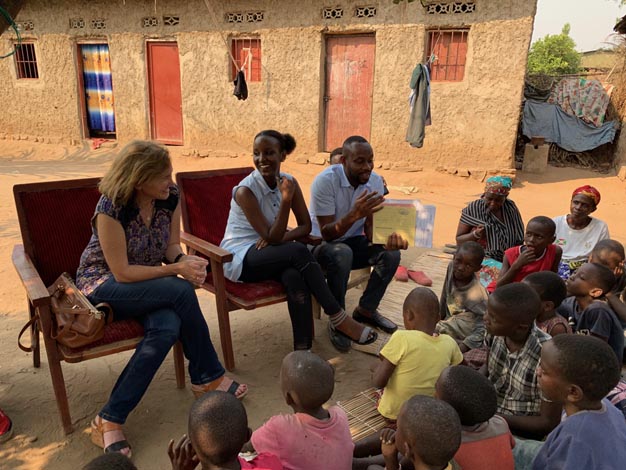
Julie Marner, a native of St. Joseph Parish in Wellman, teaches youths in Bujumbura, Burundi, in this file photo.
By Lindsay Steele
The Catholic Messenger
A new Burundi Friends International program, with financial support from St. Joseph Parish in Hills, is helping women in one of the poorest countries in the world gain financial freedom.
“Women are not highly valued” in Burundi, said Julie Marner, a native of St. Joseph Parish in Wellman who serves as the executive director of Burundi Friends International (BFI). In a country where most people engage in subsistence farming, women do not have the right to inherit land, and they continue to pay a dowry upon marriage.
However, a recent law gives Burundian women the right to buy land, said Marner, who lives in California. BFI’s Women Empowered (WE) Savings Groups provides women an opportunity to save and borrow money to increase their spending power.
A modern banking system does not exist in Burundi, so BFI works to create community-supported “mini-banks” with 20-25 women coming together weekly to save money and learn financial planning. Each participant contributes to a collective savings fund. As the savings fund grows, members can take out micro-loans. “It’s a very vulnerable concept, but they are very committed,” Marner said, noting that the program has an attendance rate of 97 percent. “Burundians understand savings, even though they’ve never had access before … they’re gaining access to money for the first time.”
With expanded spending power, women purchase commodities such as goats. Some have hopes of owning land. Marner believes the program has the potential to provide married women with greater equality in their marriages, as well. “Their husbands are seeing them in a new way, as people who can contribute financially. There’s more of a partnership.”
The program is one of several BFI endeavors aimed at helping fight poverty in Burundi through education, healthcare and economic empowerment opportunities. For the past several years, members of the Hills parish have donated to BFI efforts, with donations from 2019 going toward the WE program.
Marner noted that although young people in Burundi are highly motivated, two recent genocides have affected the country’s development. Fewer than 10 percent of Burundians have access to electricity, she said. As the population grows —- Burundian families have five children on average, according to the Population Reference Bureau — less land is available for subsistence farming. “We have to have job creation for youth. …They need new skills,” Marner said.
BFI offers English courses in 900 locations across the country, which builds on the ability of young Burundian men and women to find work opportunities. Recently, the organization began offering IT classrooms to help Burundians learn technology skills.
Burundians are also moving into leadership positions within the BFI organization. This is especially crucial amid the COVID-19 pandemic, since BFI leaders in the United States face travel restrictions. “We’re reaching our mission to eliminate poverty, but can’t do much without Burundi leadership leading the way,” Marner said, noting that a recipient of one of BFI’s college scholarships, Odette Habonimana, is BFI’s new Country Director. “It isn’t common for women to hold leadership positions in Burundi; she was the most qualified person, by far.” Habonimana earned recognition recently as one of 10 finalists for the prestigious Women Building Peace Award from the U.S. Institute of Peace.
Marner said she is grateful to the Hills parish for supporting BFI’s efforts over the past few years. “The parish has been extremely supportive. … They’ve significantly contributed” to the success of Burundi Friends International.











